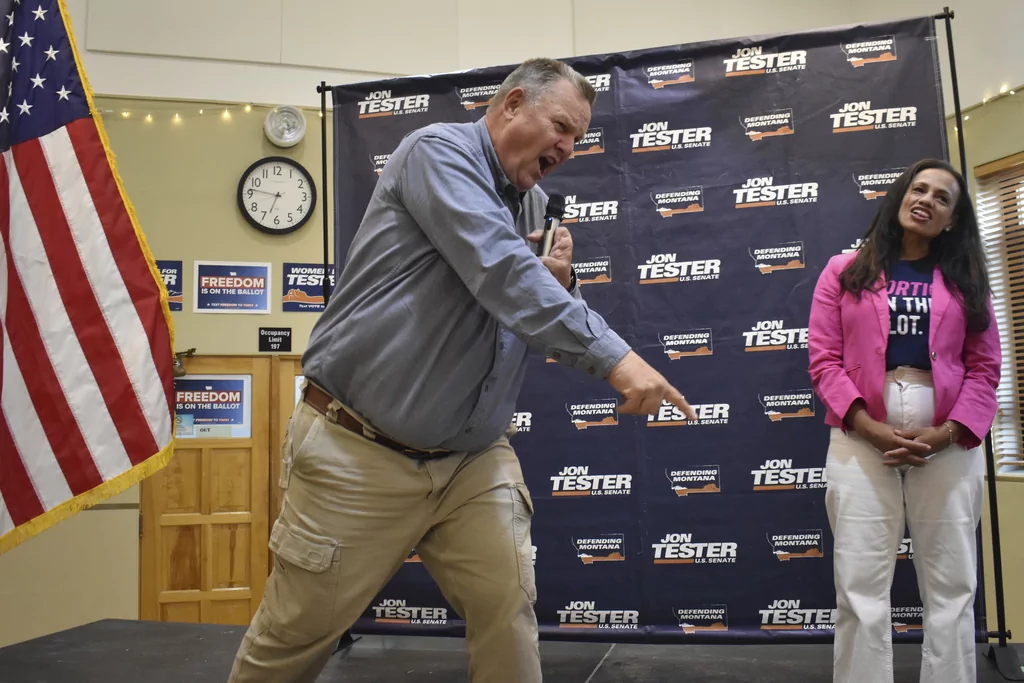
Democrats’ razor-thin control of the Senate hinges on Jon Tester holding onto his red-state seat in Montana. But if successful, the Democrat may also be the one person who could thwart his party’s liberal agenda.
It’s an irony he’s leaned into heavily on the campaign trail as he courts crucial split-ticket voters by putting distance between himself and national Democrats.
“My role is to provide a level of commonsense and reasonableness,” Tester recently told the Washington Examiner.
Of the characteristics that set him apart from many of his colleagues is his defense of the Senate filibuster that curbs the majority’s power and his vow to protect at least some version of the upper chamber’s arcane 60-vote threshold.
First, he’ll need to defy the odds once again in GOP-dominated Big Sky Country and win reelection to a fourth term.
The 68-year-old is in the midst of perhaps the toughest political fight of his decadeslong career as the chamber’s most vulnerable member. Republican and former Navy SEAL Tim Sheehy is the man trying to send him packing.
With the Democratic Caucus’s staunchest supporters of the filibuster heading for the exit doors — Sens. Joe Manchin (I-WV) and Kyrsten Sinema (I-AZ) — Tester would become one of the last lines of defense in his party to preserve the filibuster.
That’s at least what Manchin wants to be the case.
“I’m hoping so. Jon knows. He knows how tough it is. He knows what it takes up here,” Manchin told the Washington Examiner. “Obviously, with Kyrsten here, there was no need. Let’s see who the next person is. He would be one hell of a good candidate” to fight for the filibuster.
Manchin crossed his fingers. It was a gesture that, ironically, Tester himself is unable to make with one of his hands.
At the age of nine, Tester lost his middle three fingers in a meat-grinder accident at his father’s butcher shop. He still uses the same appliance — “It’s a good meat grinder!” he often boasts — and is frequently observed extending his remaining pinky and thumb to create his signature “hang loose” symbol.
But many Republicans view Tester’s pledge to protect the filibuster with a heavy dose of skepticism.
In 2022, Tester aggressively advocated for a carveout on voting rights legislation that would have effectively ended the need for 60 votes and was defeated due to Manchin and Sinema siding with all Republicans. The proposal would have instituted his preferred method of a “talking filibuster,” forcing senators to speak on the floor in opposition and block all other legislative business. Sixty votes could still end debate, or when senators would relent, final passage would require only a simple majority.
“He’s not a Sinema, and he’s not a Manchin,” Sen. Bill Cassidy (R-LA) said. “Preserving the filibuster, that was Manchin and Sinema.”

Tester has made the case that the talking filibuster would force lawmakers to the negotiating table or face weekslong gridlock.
“We’re not talking about doing away with the filibuster. We’re talking about restoring the Senate to the good ole’ days of ‘Mr. Smith Goes to Washington,’” he said in 2022. “I think it’s good for bipartisanship, and I think it’s essential for the country.”
Tester continues to advocate for a “talking filibuster” but says it should apply to all legislation.
“That will solve the problem to protect minority rights and keep the people who are obstructionists from obstructing,” he recently told the Washington Examiner.
Tester doesn’t broadcast himself as the last best protector of the filibuster, and it’s not among the core policy issues that he most talks about on the trail facing rural America, including affordability, protecting public lands, agriculture, and veterans. But in Washington, numbers matter when legislation needs 60 votes to break a filibuster but only a simply majority is required to forever do away with it.
Both parties over the past decade have eroded the filibuster’s power with carveouts to more easily confirm presidential judicial nominees, including Supreme Court justices. But from Vice President Kamala Harris to Tester’s more liberal Senate colleagues, Democrats say more carveouts or abolishing it entirely is the key to accomplishing a sweeping set of priorities on things like abortion and voting rights, gun control, immigration, and climate change.
From dirt farmer to United States senator
Before being elected in 1998 at the age of 42 to the Montana state Senate, Tester was a music teacher and began his political career as chairman of the Big Sandy School Board. Once in the legislature, he quickly climbed the ranks to become Senate president in 2005.
In January 2007, Tester traded his rugged outfits and boots on his family’s third-generation farm near rural Big Sandy for a suit and tie in the halls of Congress some 2,000 miles away in Washington, D.C.
That’s at least the case for part of the week. He and his wife, Sharla, still farm the same land that was settled by his grandparents in 1912.
Over the years, Tester has come to know a thing or two about squeaking out victories as a Democrat in a red state.
He unseated Sen. Conrad Burns (R-MT) by less than 1% in 2006, won reelection in 2012 to then-Rep. Rep. Denny Rehberg by 3.5%, and in 2018 emerged with the same margin against Rep. Matt Rosendale (R-MT), who at the time was state auditor.
The burly, foul-mouthed farmer who sports a flat-top haircut oozes a trait that longtime personal friends and Senate colleagues on both sides of the aisle say has been his key to success: Montana authenticity.
“What you see is what you get with Jon Tester,” said Montana Democratic state Rep. Paul Tuss, a longtime friend whose R+8 district overlaps with Tester’s former state Senate district.
Tuss’s occasional butcher used to be Tester, who would “show up on my doorstep with a quarter beef for me.”
“The dirty T-shirt and the Carhartt that’s a little ripped, and his work boots would have a lot of dirt on them,” Tuss said. “He feels far more comfortable on the farm, in my opinion, probably than he does in the Capitol.”
Montana’s other U.S. senator is Republican Steve Daines, chair of the Senate GOP’s campaign arm. That means it’s his job to make sure Tester is out of a job after November, an awkward component of their working relationship.
On a Wednesday morning in Washington last month as Congress prepared to head home for the last time before Election Day, Daines reflected on his experience serving with Tester. The two had gathered just hours earlier for “Montana Coffee,” their weekly bipartisan tradition where they and other members of the Montana delegation grab a cub of joe face-to-face with constituents visiting the nation’s capital.
“It’s not a personal issue. It’s just we vote very differently,” Daines told the Washington Examiner. “We need to have a senator who votes more in line, I think, with where Montana is today, and Montana has become more conservative. Jon Tester is just too liberal for our state.”
The GOP is marching toward Senate control
Tester’s race is on track to be the Senate majority-maker. A win would likely mean Democrats retain control, but a loss would almost certainly hand the reins to Republicans.
His prospects look increasingly bleak, as Trump-endorsed Sheehy pulls ahead in the polls and nonpartisan election forecasters give the Republican a slight edge. Tester is increasingly appealing to split-ticket voters by putting his national party and the Biden administration at arm’s length, a strategy that Republicans counter is undercut by his voting record that aligns more than 90% of the time with President Joe Biden.

Montana has become increasingly red in the nearly 20 years since he first arrived in the Senate, and the state Democratic Party’s power in the legislature has drastically diminished.
“The young version of Tester, who would be 35, I don’t know that he’s going into politics as a farmer and a rancher,” said Eric Stern, a former senior adviser to former Montana Democratic Govs. Brian Schweitzer and Steve Bullock. “It’s less likely that that person’s going to run as a Democrat.”
Tester is the last man standing statewide for Democrats. And if he goes, the rest of the party’s ranks in Montana is likely to also suffer.
Democrats controlled the governor’s mansion throughout Tester’s tenure until Gov. Greg Gianforte’s (R-MT) 2020 election, and they haven’t had an outright majority in either state house since 2007. Now, the GOP has super majorities in the state legislature. Gianforte cruised to victory by 13 points, and his reelection this year is considered a “solid” Republican seat.
“It’s become harder and harder, and that’s just the nature of how national politics have changed, and what you hear coming out of the leaders in Washington,” Stern said of Democrats’ outlooks in Montana. “There were a lot of old-time Democrats who remember the party as being pro-farmer, a pro-agriculture party for the farmers and for the laborers.”
Tuss, the longtime Tester friend and state representative up for reelection in a Republican district, put the onus on the state party to better “focus on the core issues that are central to their families,” including affordable housing, infrastructure, and simply embracing a style of “government that works.”
“I think that sometimes we get wrapped up with regard to the cultural wars that seem to dominate national politics, and we sometimes lose the argument when those things occur,” he said. “Rather than discussing these meat and potato issues that really are the issues that are so central to our party, sometimes we get lost in those culture war issues.”
Tester, to the acknowledgment of his Senate colleagues, regularly focuses on key policy issues like agriculture and infrastructure. He’s also known for his work on veteran issues as chair of the Senate Veterans’ Affairs Committee.
Tester cited the 2022 Bipartisan Infrastructure Law, which he helped craft, and his 2022 PACT Act to provide health care and benefits to veterans exposed to toxins as his greatest legislative achievements.
CLICK HERE TO READ MORE FROM THE WASHINGTON EXAMINER
But Tester’s kryptonite this go-around could be former President Donald Trump. The two will appear on the same ballot for the first time, complicating Tester’s ability to peel off crucial split-ticket voters.
“We are in exactly the position I thought we would be in, and we’re going to win,” Tester said as he boarded a Senate subway car. “I don’t say that lightly. You can take that to the bank.”





